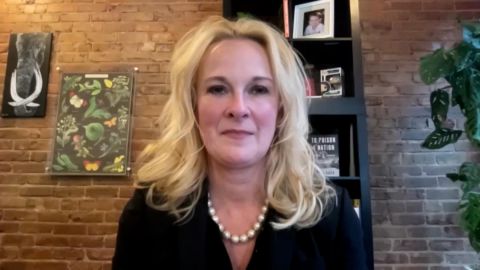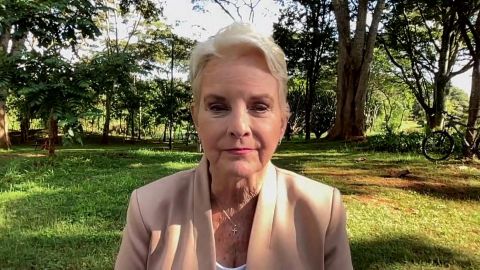Read Transcript EXPAND
CHRISTIANE AMANPOUR, CHIEF INTERNATIONAL ANCHOR: Cindy McCain is joining me now from Nairobi, Kenya, where the U.N. secretary general is sharing emergency meetings. Welcome to our program.
CINDY MCCAIN, EXECUTIVE DIRECTOR, WORLD FOOD PROGRAMME: Thank you. I appreciate it.
AMANPOUR: So, here’s your chance to tell the world what you need, and particularly in Sudan right now, can you, as a human organization dedicated to feeding people in these emergencies do it.
MCCAIN: Well, Christiane, as you know, we are facing an unprecedented year with regards to food and food insecurity around the globe. We — right as this point, we do not have enough money. We need more money. But with that said, in a place like Sudan, we — I want everyone to know, we never left Sudan, even though it became — I would say, we lost three people, we’ve had some very dicey situations, we’re working in the east now and in those — the places that we are relatively safe. But — so, I want people to know, WFP never left. And this is what we do. This is how we do it. And I think most of all, if I could say anything, I’m so proud of the WFP people that are working on the ground in Sudan It’s a very tense place right now.
AMANPOUR: Can I ask you, because you are obviously attending meetings, all of this must be, as I said, the secretary general is there, what are the — what are you trying to hammer out now?
MCCAIN: Well, basically, because we have called for and haven’t acted a completes ability for all of our — of the U.N. agencies to get in and work. What we’re trying to hammer out is funding. We’re trying to hammer out, you know, security issues, obviously, and where we go with this. And most of all, trying to make sure that all of us are on the same page with regards to what’s going on and how we proceed.
AMANPOUR: I mean, it’s obviously disturbing to hear that a major U.N. agency — I mean, I know it happens a lot, is short of funds in these kinds of emergencies. But also, we hear today, that the insecurity in Sudan has led not just to the killing of some of your staffers, but also to the looting of your food. If I’m not mistaken, something like, you know, $13 to $14 million worth of food are just being taken from the trucks. Who’s doing this? Is this desperate hungry people or are these warlords juts trying to sell it off?
MCCAIN: I think it’s a combination of things. They have not only looted our food, but some of our trucks are gone. They’ve — you know, they’ve completely gone into our housing and destroyed that. It’s an all-out wilding, as far as I’m concerned, in Sudan. The important thing to remember is that we — with our other U.N. agencies, we’re working on how we can get into more places and work as best we can to provide food to those who are most vulnerable and left behind because of this, and it’s usually women and children.
AMANPOUR: Indeed. And we see the pictures show that there are so many. I mean, tens of thousands, perhaps, eventually, hundreds of thousands. The U.N. refugee agency warns that more than 800,000 people may flee to neighboring countries. Right now, it’s mostly to South Sudan, it’s also to Chad, but we can also see boatloads of people being taken to Saudi Arabia. How much does this all complicate? Because that could even grow worse, the refugee part of this, with the climate crisis.
MCCAIN: Right. The refugee issue is a very serious and we take our job, providing services for them, very seriously. It’s a — the whole thing is just — it’s not only outrageous, but it’s very dicey. I met with some folks that got out, some of our WFP folks that were able to get out and come, they’re in Nairobi now. And these horror stories that they were telling me it’s unconscionable to see and hear what’s going on there. And at some point, we need to hopefully pray for a peace deal so that we can get back in there and feed in a comprehensive fashion the way we were before.
AMANPOUR: Give me an idea, just one horror story. What do you mean exactly?
MCCAIN: Well, their homes were looted. One particular person has a child with them. The child saw what was going on and hasn’t spoken in a week. It’s just — it’s those kinds of things, the trauma and the tragedy. And WFP is providing counseling for those people, as of course we should and would always do.
AMANPOUR: Yes. These are your staffers, obviously. So, Ethiopia, you have suspended operations in the Tigray region after reports that aid was being diverted and then sold, as we’ve just been discussing. This is — it’s obviously really difficult, whether in Sudan, in Ethiopia, to provide food even in situations where you don’t know if it’s going to the right people, not to mention, the danger.
MCCAIN: Right. Yes. This is — WFP immediately launch a comprehensive investigation with regards to this — to the food diversion. And I think, more importantly, remembering that we condemn anything like that. And I’m — personally, I’m outraged and from a WFP standpoint, we simply won’t tolerate this. So, we’ll find out exactly happened. But in the meantime, what this means is that people that would normally be distributed aid to are not going to get it. So, once again, more people, usually the most vulnerable are being pushed aside.
About This Episode EXPAND
The number of people facing acute food insecurity worldwide has more than doubled since 2019. The U.N. World Food Programme’s Cindy McCain joins the show. Simon Schama and Mark Landler on how Great Britain feels about a new king — and the future of the monarchy itself. In Oklahoma, new legislation is being worked out to protect women who kill their abusers in self-defense.
LEARN MORE

